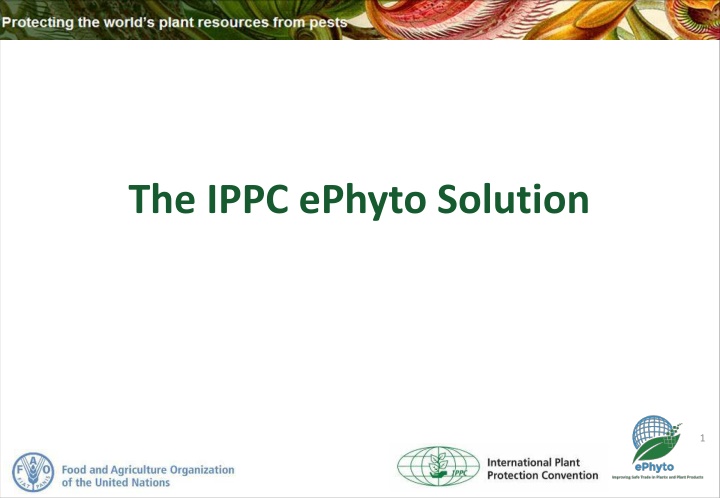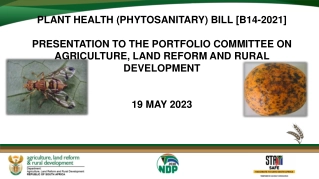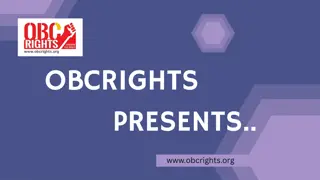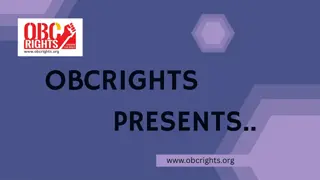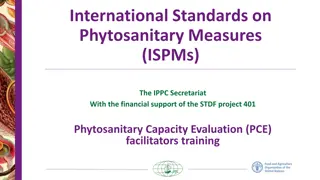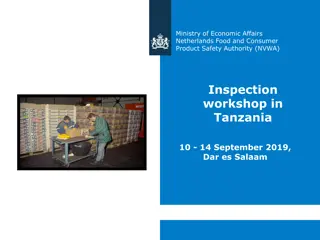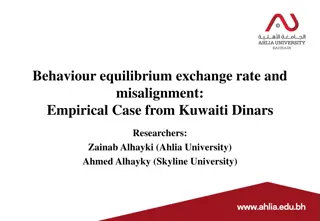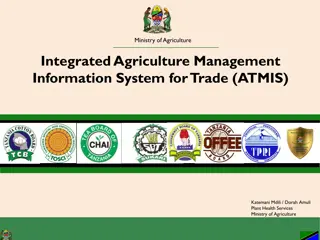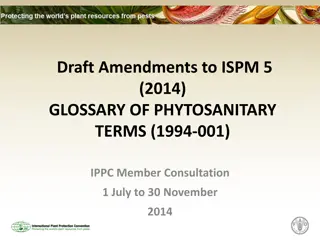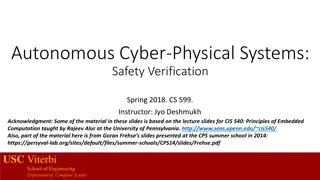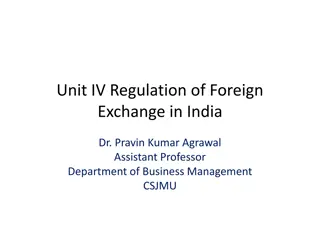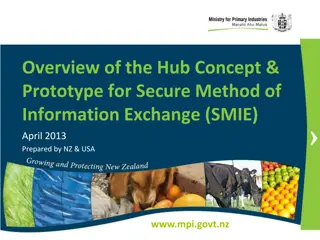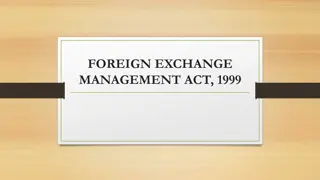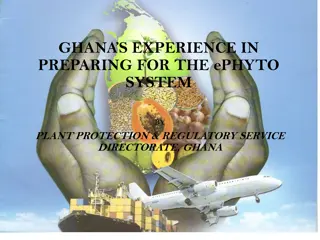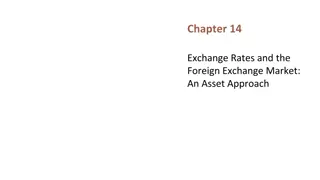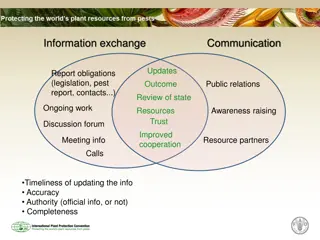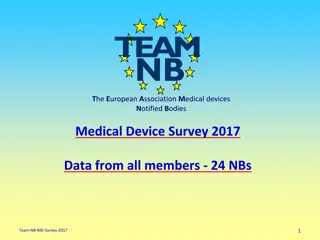Revolutionizing Phytosanitary Certificates Exchange with ePhyto Solution
This cutting-edge ePhyto Solution project aims to streamline the electronic exchange of phytosanitary certificates globally. By introducing a harmonized set of rules, it facilitates interactions among developing and developed countries, reducing paperwork, costs, and delays associated with manual processes. With a focus on efficiency and reducing document rejections, this initiative revolutionizes the phytosanitary certificate exchange landscape, benefiting businesses and the environment.
Download Presentation

Please find below an Image/Link to download the presentation.
The content on the website is provided AS IS for your information and personal use only. It may not be sold, licensed, or shared on other websites without obtaining consent from the author.If you encounter any issues during the download, it is possible that the publisher has removed the file from their server.
You are allowed to download the files provided on this website for personal or commercial use, subject to the condition that they are used lawfully. All files are the property of their respective owners.
The content on the website is provided AS IS for your information and personal use only. It may not be sold, licensed, or shared on other websites without obtaining consent from the author.
E N D
Presentation Transcript
The ePhyto Solution Project in brief Project to facilitate the electronic exchange of phytosanitary certificates Everyone using a single harmonized set of rules The only project of its kind among the three SPS sisters (IPPC, Codex, OIE) Allows developing and developed countries to participate regardless of infrastructure capacity Simplified setup and participation Initial funding from the STDF, augmented with resources from Contracting parties and the World Bank
Why ePhyto? An example Non-compliant documents trigger a higher number of import rejections than actual plant health issues (harmful organisms): 4
As well as. Inefficient processes in place - labor intensive and highly manual with physical paperwork being couriered around and often re-entered Millions of emails sent in the grains industry alone more than 275 million emails are sent annually to process the estimated 11,000 shipments of grain transported on the ocean worldwide Any re-issuing of paper phytosanitary certificates has a tremendous cost for business Time and money Deterioration of commodities waiting for clearance Customer claims for late deliveries or bad quality Mountains of paper, a lot of it expensive paper, are produced, printed and stored or destroyed on an annual basis 5
In the beginning Point-to-point transmission Point-to-point exchange is when ePhyto exchange occurs directly between an exporting country and an importing country. In each case, the country needs to establish separate bilateral arrangements with each country to facilitate exchange. High costs for establishing separate connections (@$120K per connection) and significant annual costs ($20K-100K) for maintaining separate connections with each partner country 6
The IPPC ePhyto Solution NPPO NPPO of country C of country A HUB GeNS NPPO NPPO of country B of country D Single-point transmission (HUB) Single point (HUB) exchange allows exchanges between all of the countries connected to the hub Any new country connecting to the hub will be able to exchange certificates with all of the other connected countries
What is an ePhyto? ePhyto is short for electronic phytosanitary certificate . ePhyto is the electronic equivalent of a paper phytosanitary certificate (ISPM 12) ePhyto is not a PDF or a fax This is part of an ePhyto ->
Hub and GeNS Countries with National Systems Countries using the GeNS UNICC China Ghana United States Hub GeNS Sri Lanka Samoa Argentina
Recent Highlights The Hub pilot finished in Spring 2018, was successful and went fully operational in June with countries exchanging ePhytos The Generic National System (GeNS) was built and the pilot began in Fall 2018 Sri Lanka has already successfully exchanged ePhytos with the US, Ghana has also been sending The G-20 Agriculture Ministers at their July 2018 meeting endorsed the IPPC s efforts to build the ePhyto system Very successful Latin American (18 countries represented) and Asia Pacific (28 countries represented) regional IPPC ePhyto workshops took place Currently 31 countries are registered on the Hub and several additional countries are joining in 2019 (including Brazil, Mexico and the EC representing an additional 26 or 27 countries) Early industry case studies indicate time savings from 1-2 hours to 1-2 days 10
The ePhyto Solution Project in brief Project to facilitate the electronic exchange of phytosanitary certificates Everyone using a single harmonized set of rules The only project of its kind among the three SPS sisters (IPPC, Codex, OIE) Allows developing and developed countries to participate regardless of infrastructure capacity Simplified setup and participation Initial funding from the STDF, augmented with resources from Contracting parties and the World Bank
Why ePhyto? An example Non-compliant documents trigger a higher number of import rejections than actual plant health issues (harmful organisms): 14
As well as. Inefficient processes in place - labor intensive and highly manual with physical paperwork being couriered around and often re-entered Millions of emails sent in the grains industry alone more than 275 million emails are sent annually to process the estimated 11,000 shipments of grain transported on the ocean worldwide Any re-issuing of paper phytosanitary certificates has a tremendous cost for business Time and money Deterioration of commodities waiting for clearance Customer claims for late deliveries or bad quality Mountains of paper, a lot of it expensive paper, are produced, printed and stored or destroyed on an annual basis 15
In the beginning Point-to-point transmission Point-to-point exchange is when ePhyto exchange occurs directly between an exporting country and an importing country. In each case, the country needs to establish separate bilateral arrangements with each country to facilitate exchange. High costs for establishing separate connections (@$120K per connection) and significant annual costs ($20K-100K) for maintaining separate connections with each partner country 16
The IPPC ePhyto Solution NPPO NPPO of country C of country A HUB GeNS NPPO NPPO of country B of country D Single-point transmission (HUB) Single point (HUB) exchange allows exchanges between all of the countries connected to the hub Any new country connecting to the hub will be able to exchange certificates with all of the other connected countries
What is an ePhyto? ePhyto is short for electronic phytosanitary certificate . ePhyto is the electronic equivalent of a paper phytosanitary certificate (ISPM 12) ePhyto is not a PDF or a fax This is part of an ePhyto ->
Hub and GeNS Countries with National Systems Countries using the GeNS UNICC China Ghana United States Hub GeNS Sri Lanka Samoa Argentina
Recent Highlights The Hub pilot finished in Spring 2018, was successful and went fully operational in June with countries exchanging ePhytos The Generic National System (GeNS) was built and the pilot began in Fall 2018 Sri Lanka has already successfully exchanged ePhytos with the US, Ghana has also been sending The G-20 Agriculture Ministers at their July 2018 meeting endorsed the IPPC s efforts to build the ePhyto system Very successful Latin American (18 countries represented) and Asia Pacific (28 countries represented) regional IPPC ePhyto workshops took place Currently 31 countries are registered on the Hub and several additional countries are joining in 2019 (including Brazil, Mexico and the EC representing an additional 26 or 27 countries) Early industry case studies indicate time savings from 1-2 hours to 1-2 days 20
